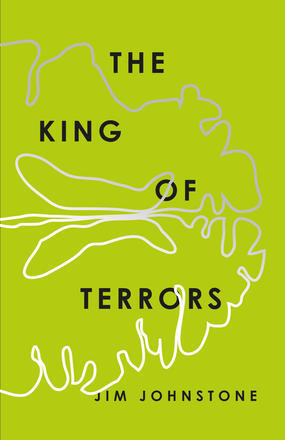
Lyrical Authenticity by Klara du Plessis
The King of Terrors, Jim Johnstone. Coach House Books, 2023.
Jim Johnstone is a force on the Canadian literary stage. Founder of Anstruther Press that produces limited edition chapbooks, and poetry editor at Palimpsest Press, he has launched careers equally as he continues to shape a supportive and generative environment for the advancement of the literary arts. Johnstone is also a masterful poet. Following his ambitious trilogy on the contemporary human condition in relation to technology, consumerism, mental illness, and addiction — Dog Ear, The Chemical Life, and Infinity Network — The King of Terrors is fearless in its honesty and light in poetry’s kinship to the page.
The assumption of truth in literature is forever masked by the instability of authenticity, and the theoretical remove between author and poetic speaker or character. At a first glance, Jim Johnstone’s seventh collection of poetry, The King of Terrors, functions on the premise of honesty, intimacy, and vulnerability. Biographically speaking, this mature and moving series of poems grapples with Johnstone’s real-life brain tumour diagnosis. They wrestle with illness and mortality, a state that underscores the bond with loved ones, particularly Johnstone’s wife — occasionally mentioned by name. In this context, the collection opens in a confessional mode, a style of poetry that works to reveal and mobilize personal, and often traumatic, details about the author. At intervals, for example, Johnstone attempts to atone for a lifetime of perceived grievances. In the introductory poem, he asks, “are you able to forgive? // If I can confess, then I’m sorry [. . .] I’ve done everything I’ve been accused of doing” (“Future Ghost”). As the collection progresses, however, this initial goal of veracity and the gesture of making amends are systematically dismantled through the infrastructure of the lyrical itself. In a more defiant tone, Johnstone asserts:
my actions were perceived. (“The Darkroom”)
In a face-off with himself in a mirror, the binary between author and poetic speaker is literalized. Johnstone and his reflection establish the remove between ego and lyrical address, a versioning of self that distances itself increasingly from any possibility of faithful representation. This split in subjectivity is amplified tenfold through the presence of the tumour — a malignant growth which functions to physically alienate Johnstone from himself. Agency has been usurped, so that Johnstone writes a new truth: “I don’t own my own body” (“Future Ghost”). What reigns is “[f]ear of the body [. . .] Fear as king, // as crown” (“The King of Terrors”). “[F]ear,” synonymous to “short story, / the novel” (“False Finish”), opens towards the fictive so that a threatening correspondence between the self and the self, or between the body and the same body, amplifies a subtext of deception and unreliability.
Central to the collection and its thematic is a powerful visual and serial erasure poem entitled “Slice-Selective Excitation (Brain Scans 1-5).” As explained in an endnote, the visual material “includes a horizontal section taken from a brain occluded with a left-frontal lobe meningioma.” The source text, describing the “[u]ncontrolled spread [of] my identity, my self,” is overlaid with the shape, first, of the brain cross-section and, then, of the tumour. These outlines — brain and tumour — do not fit neatly over one another, emphasizing the foreign nature of the growth. Colonizing and violently transforming the poet’s physical and mental sense of personhood, “[t]he tumour [becomes] a proxy for the mind itself.” Carving words away from the source text — perhaps to replicate the brain’s invasion, on the one hand, and surgery on the other — what is left is a sparse smattering of words across the full page: “I // apologize // for // the // times // I’m // not // myself.” Here Johnstone returns to the confessional mode, but with the distinct purpose of distancing himself from his own person, with whom, through the estranging forces of illness, he does not identify.
Socrates, via Plato, famously denies poetry due to the perceived deceptive method of literary representation. In The King of Terrors, Johnstone questions the feasibility of truth and redefines it as creative practice. His authorial voice simultaneously narrates the supposed facts and is unable to do justice to who he is or how he feels. If he as the poet is doubled, made other, and torn apart, the symbolic rendering of sincerity in writing is already suspect at its source. If the author is already speaking as a likeness of himself, then the poetic speaker’s alterity could be reversed to inhabit a sense of fidelity to Johnstone’s lived reality instead. The alleged untruth of art becomes aligned with Johnstone’s misrecognition of self. Lyric self — even in its inherent affective transliteration of experience into verse — counterintuitively aligns itself with facticity. Discourse risks mind games, but when the poet blinks in and out of his identity, then poetry demands more concrete attention: “you’ll have to / consider these words // my presence” (“Literally ‘Former, Elder’”). Poetry becomes presence and truth, perhaps not in a scientific, quantifiable sense, but in the emotive, qualitative, and emblematic intent of art.
I’m a lyre. (“This Is the End”)
To end with a spoiler, the final lines of this collection intertwines representation — in the form of an invisible image, a photo without a screen — with the capricious interrelation and exchangeability of truth and falsehood. Concluding with the virtuosic shift of homophones from “liar” to “lyre,” Johnstone destabilizes the archetype of the poetic figure strumming his lyrical instrument in pastoral innocence. Even if the poet speaks in myth, even if the symbolic were not true, there is, in the end, the enduring presence of poetry.
— Klara du Plessis is an interdisciplinary artist-scholar, literary curator, and poet.











